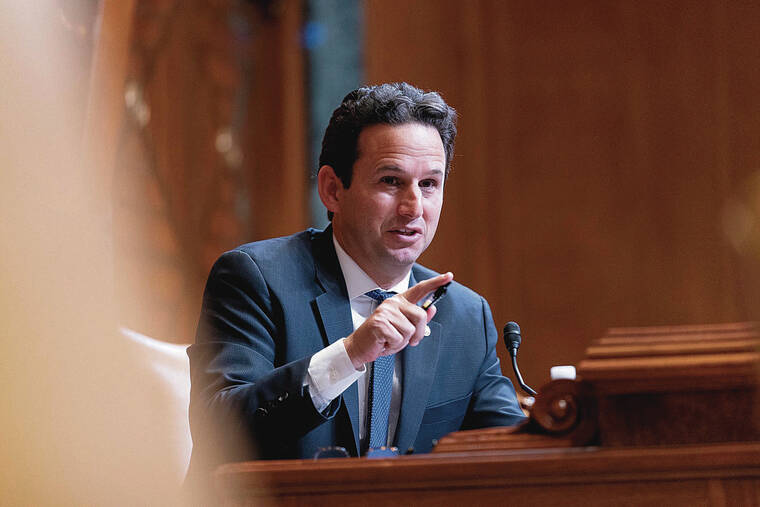Native Hawaiian leaders told U.S. Sen. Brian Schatz, D-Hawaii, and the Senate Committee on Indian Affairs this week that more funding and program access is needed from Washington to better fulfill the government’s federal trust responsibility.
Schatz, who chairs the
Indian Affairs Committee, wrapped up the second of two field hearings Thursday at the University of Hawaii at Hilo. The first hearing was held Wednesday at UH Manoa’s East-West Center.
On Wednesday, Schatz said it was the first time in more than a decade that the Indian Affairs Committee had conducted hearings in Hawaii in an effort to seek equity for Native Hawaiians.
“The federal government has a trust responsibility to Native Hawaiians — just like it does with American Indians and Alaska Natives —and that trust responsibility must be fulfilled,” Schatz
declared. “That is why we brought this conversation home.”
On Thursday several Native Hawaiian educators told the committee they could use a helping hand with additional support and access to grants and programs that are often out of reach.
Namaka Rawlins, director of the ‘Aha Punana Leo Hale Kipa ‘Oiwi program, said
Native Hawaiian education as a whole, regardless of the language in which it is delivered, lacks regular federal funding similar to other
Native American educational programs.
“Addressing those needs can be seen as part of the overall federal trust responsibility to Native Hawaiians,” Rawlins said.
“One of our biggest challenges is really fitting in a box that we don’t fit in,” added Keiki Kawai‘ae‘a,
director of Ka Haka ‘Ula o Ke‘elikolani College of Hawaiian Language at UH Hilo. “We’re not tribal, yet the grants are going to different offices that we can’t apply for.”
Kawai‘ae‘a said many mainland faculty members and funders view her college as a standard foreign language and foreign area-studies program. But the college often misses out on the resources such programs receive, including from any of the 15 federally funded national foreign-language resource centers.
“The lack of such support severely hampers our ability to reach the full potential of our various Native Hawaiian and Native American programs,” she said — which is unfortunate, she said, because the college is working hard to train teachers to help fill the ongoing shortage of Hawaiian-language immersion teachers across the state, estimated to reach about 100 in the upcoming school year.
Amy Kalili, writer, producer and small-business owner, said Native-language television could use similar levels of funding that many Indigenous people around the world receive. In Hawaii, she said, there is no stable source of funding.
“This is in stark contrast, for example, to the Maori broadcast efforts in Aotearoa (New Zealand) that receive upwards of
$40 million annually and the Welsh initiatives that receive well over 80 million pounds annually,” she said.
UH Hilo professor Noa Kekuewa Lincoln spoke about agriculture in the islands. He said Hawaii is a state of small farms, with 90% of the 7,328 farms being less that 50 acres in size — yet 90% of the value is produced by only 13% of the farms, the big producers.
Lincoln, who is president of the Mala Kalu‘ulu Cooperative and adviser to the
Hawai‘i ‘Ulu Cooperative, said the federal government could help even the playing field by offering additional technical support and easier access to capital and by
investing in the kind of
infrastructure that would help small farms.
“Hawaii lacks adequate infrastructure for aggregation, processing, storage and transportation of local food within the state,” he said.
In his opening statement Wednesday, Schatz said that since becoming the committee’s chairman in 2021, he has delivered more than $270 million in direct funding to Native Hawaiians.
“There’s two ways to look at that,” he said. “One is that’s extraordinary and that’s great. The other is that … it’s also not enough, and it’s just the beginning of what we need to accomplish.”
But Schatz said he was able to capture increases in funding across the board for housing, education, health care, food and agriculture, broadband, and culture and the arts.
He also helped to secure policy changes in the Violence Against Women Act to address domestic violence in the Native Hawaiian community, including setting up a review of federal crime prevention victim services and criminal justice programs serving Native Hawaiians, ordering a federal report on Native Hawaiians
in the criminal justice
system and sending $1 million in new funding for a
Native Hawaiian resource center on domestic
violence.
“This is just a start,” he said, “because we know we have so much more to do.”
Schatz became chair of the Committee on Indian
Affairs in February 2021. Sen. Lisa Murkowski, R-Alaska, is vice chair.

